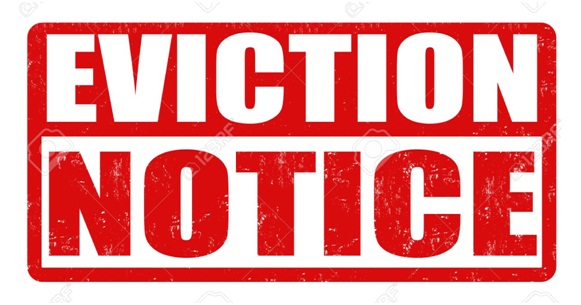A Guide to the Eviction Process

Sometimes it becomes necessary for a landlord to use his right to evict a tenant. If you are evicted for non-payment of rent, you may avoid eviction if you pay all the overdue rent (plus interest and any fines if the landlord charges you for them). You can avoid eviction by paying the overdue rent upon receiving the 3-day notice. If there is no statement in the notice of your right to remain in the rental unit, you have to pay or get out on the date your answer is due or face a lawsuit. Landlords should follow all eviction procedures per state law, plus they must follow the terms and conditions of the lease or rental agreement.
Eviction Notice
Your landlord may evict you if you are not paying your rent, or if you have caused excessive damage to landlord property, or if you have otherwise violated the terms of your lease. If the owner is terminating your residence (evicting you) for non-payment of rent, they will send you a “3-Day Notice to Pay Rent or Quit.”.
If they are evicting for a different reason, you will get written notice with a different time frame. Your lease will specify the time frame for various terminations; it is sometimes seven days. A landlord cannot lock you out or throw you out of your living accommodations. Only a judge can order you off the property, and only sheriff’s deputies may remove you. If you are evicted, state law provides you with some protections. You may need to visit a lawyer.
If You Are Unable to Pay Rent
If you are unable to pay the rent you owe, you have the option of vacating the unit in three days. This may stop the landlord from taking you to eviction court, and you will avoid having an eviction lawsuit on your record. Provide your keys and documents to your landlord and notify them you are vacating the unit. This way, your landlord can inform their attorneys not to file the eviction case.
For information, however, evictions can impact your ability to lease other rental housing. Even if you vacate within three days, but you continue to owe your landlord the rent money, your landlord may still sue you for any rent and interest you owe plus legal fees. For more information on illegal eviction practices, please visit the site https://expressevictions.com/california-eviction-notices/60-day-notice-to-vacate/.
Keep smart Records
Keeping documentation of all of your rent payments is crucial to protect yourself against wrongful eviction. Paying rent into a dropbox, or paying in cash but not receiving a receipt from the landlord can leave a tenant at risk of claims that the money was lost or never received. Pay your rent by check whenever feasible. If you are unable to pay by check, be ready to use a money order. However, take precautions to prove you paid by photocopying the money order once you fill it out and before you send it. Usually, it will take months for the money order company to recover documentation of the quantity if you request it, often too long before the eviction process concludes.
Your landlord must provide you with a receipt upon your request, or you can prepare a receipt yourself to have the owner sign and date. If you pay in cash, the owner ought to automatically issue you a receipt; some states require this by law. Ask a third party witness to go with you when you pay. They bear witness that the rent was paid and received.
Hire An Eviction lawyer
As is most often the case for legal matters, every eviction case is different, but all evictions must be carried out per state and local laws. An eviction attorney can really help facilitate the process of eviction. An attorney can also help you avoid legal ramifications if you are being evicted.
First and foremost, since eviction requires due process of law, you should consider hiring an experienced attorney to file the case for you in court, especially if you’ve never done it before. An experienced eviction attorney handles the entire case, from writing and serving the notice, to filing the lawsuit if the tenant doesn’t move out or pay up, to representing landlords in court to ask a judge to force the eviction if necessary.







